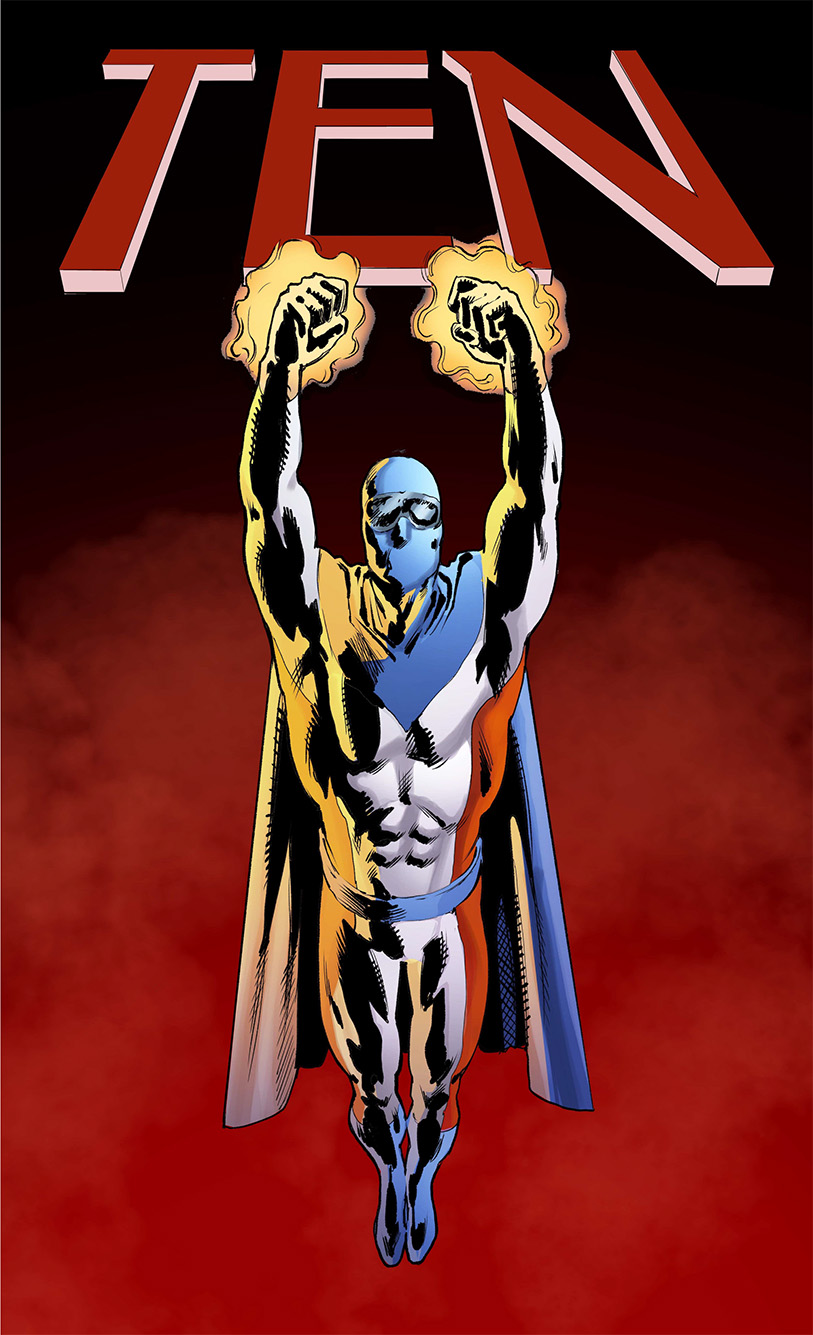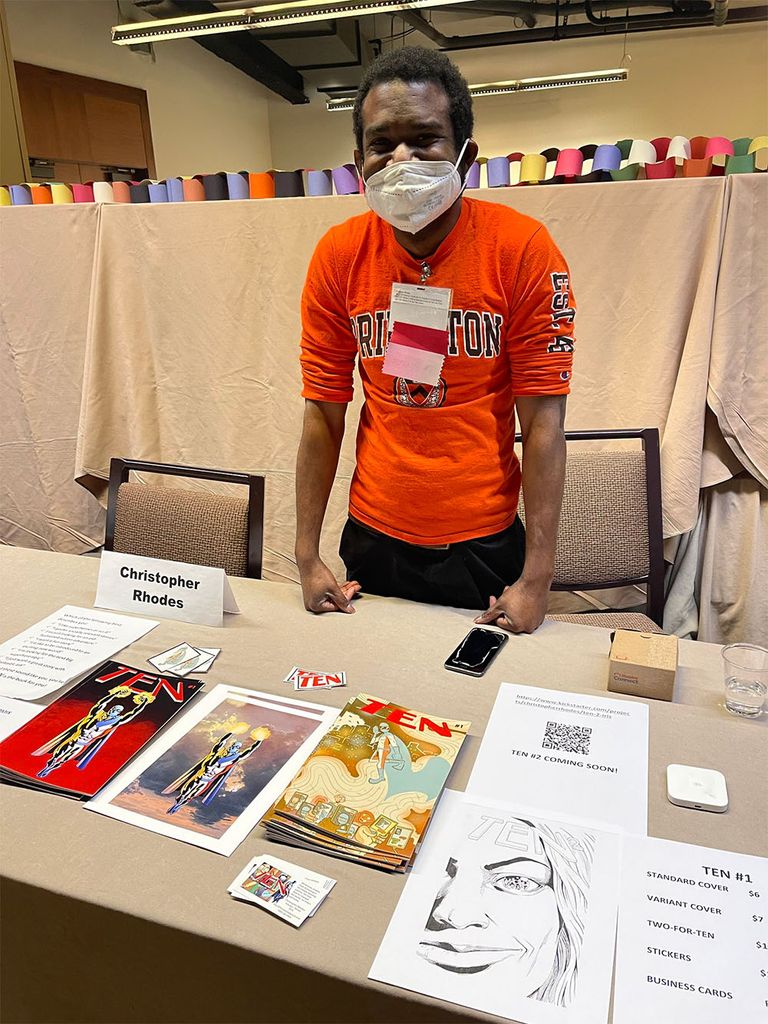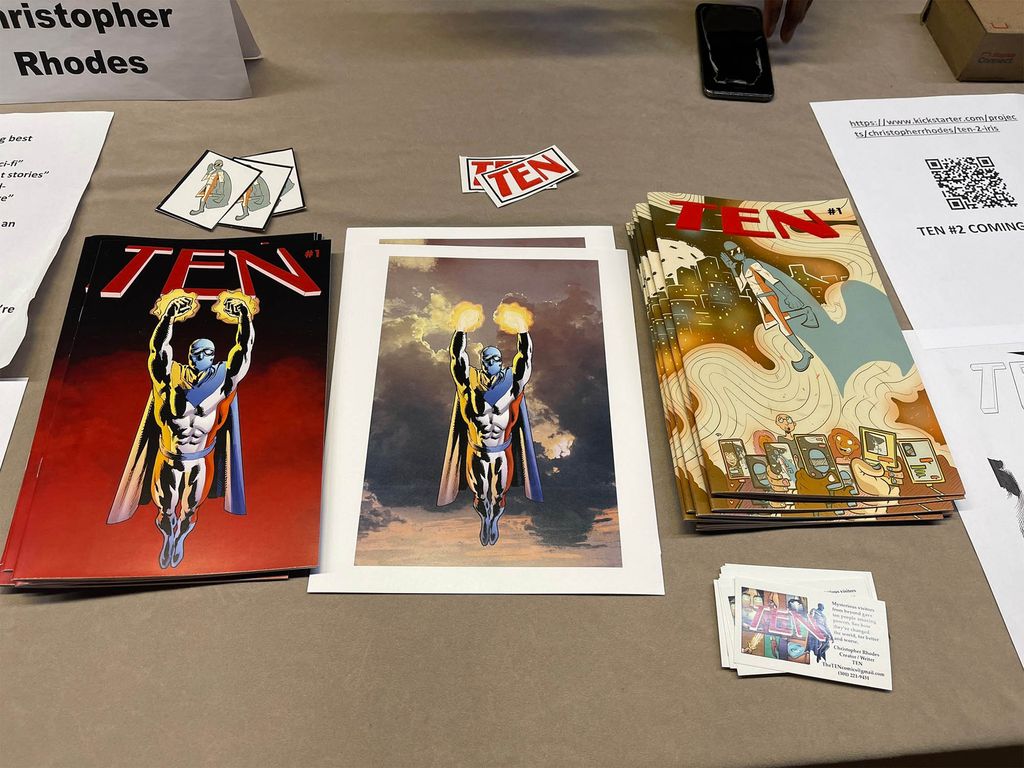It’s a Bird! It’s a Plane! It’s a Politically Charged Superhero Comic!
In CGS lecturer Christopher Rhodes’ TEN, a Black Navy veteran is given superpowers

Christopher Rhodes’ comic TEN offers a politically charged superhero story, as a Black veteran is given superpowers by aliens and becomes the superhero PeaceKeeper. Cover courtesy of Christopher Rhodes
It’s a Bird! It’s a Plane! It’s a Politically Charged Superhero Comic!
In CGS lecturer Christopher Rhodes’ TEN, a Black Navy veteran is given superpowers
Christopher Rhodes focuses his research and teaching on politics and religion in Africa. But when the pandemic brought the College of General Studies lecturer in social sciences a bit of spare time, instead of a scholarly project, Rhodes wrote and published a comic book about a Black superhero.
“I started thinking it would be interesting to write a superhero story in the midst of a pandemic, in the midst of Black Lives Matter and everything that was going on,” Rhodes says. “What if we had these characters drop in, not in Metropolis, but in our world, right now?”
The first issue of the comic book he named TEN is set a few years after 10 ordinary humans have been given extraordinary powers by alien visitors. Black Navy veteran Brian Johnson is now the superhero PeaceKeeper. But America is still America, the racial divide still in place.
PeaceKeeper is expected to answer for the Black Lives Matter protests, even though he’s banned by law from bringing his superpowers to bear in the United States. “You mean they don’t want a super-powered Black man flying around when people are protesting racism?” one of his friends asks sardonically.

You mean they don’t want a super-powered Black man flying around when people are protesting racism?
Rhodes published TEN himself with help from a crowdfunding campaign and is selling it at comic book conventions and online. You can buy hard copy or it can be downloaded or read online.
In the inaugural issue, the kidnapping of two US senators means PeaceKeeper has to go to work despite the challenges he faces—especially after community activists are blamed for the abduction.
“Law or no law,” PeaceKeeper says, “I’m done being silenced.”
“He’s a superhero. He’s a Navy guy. He’s in the government, he’s in the power structure, you know, but he’s also a Black man in America,” Rhodes says. “Think about how that will play out. What would he do? What would you do?”
Rhodes created TEN with penciler/inker Marcos Lima, colorist Sal Monaco, and letterer Buddy Beaudoin, all of whom he found online. Artist Lane Lloyd created an alternative cover.
“One of the really cool things about this is that it’s such a huge comic community online, and a huge kind of independent comic community in particular,” he says. “If you put out a call saying, ‘Hey, I’m looking for an artist,’ you get 100 replies from different people with different styles, different quality, a different color.”
A Kickstarter campaign raised more than $2,000 to publish the first issue, and Rhodes has already begun a prelaunch crowdfunding campaign for the second issue. “Even compared to a few years ago, crowdfunding is now a big thing,” he says. “Someone said that crowdfunding is essentially the third largest publisher of comics now after Marvel and DC.”
Rhodes is the father of three, and he says the comic has been a hit with his youngest child, seven-year-old Max. “He wants to be a scientist. He wants to be a teacher like his dad. He wants to fly to the moon,” Rhodes says with a grin. “He is a huge Spider Man fan, as most kids are, and he in particular has really gotten a kick out of me drawing my own comic book now.”
The origin story behind TEN begins with another little boy, Rhodes himself, growing up “in South Carolina, in a rural town in the middle of nowhere. I was into comic books and all that kind of nerdy stuff as a kid, which was really cool,” he says. He was a fan of the Teenage Mutant Ninja Turtles, a TV show called Gargoyles, and the X-Men.
“I just love that storytelling, it’s like, you know, the sky’s the limit, right? Like powers and flying around and adventures in space. And it’s just like this limitless form of imagination. And so that really appealed to me as a kid.”


Rhodes is marketing TEN online as well as at conventions like last fall’s Massachusetts Independent Comics Expo. Photos courtesy of Christopher Rhodes
But by high school Rhodes was getting serious about academics, specializing in debate, which gave him his first look at Boston when he came to Harvard for a competition. Soon there was little time for “childish” things like comic books. He went on to earn a BA, an MA, and a PhD in government from Harvard.
“I ended up getting into African politics,” he says. “I got into studying religion initially; it was something that was important to me personally, but also fascinating as an academic topic. And from that [I moved] to the ways in which race or gender or all these different things impact politics, whether it’s an election, whether it’s protests, all these kinds of things.”
But as he got older, the X-Men movies and The Dark Knight brought to life characters and stories Rhodes knew from childhood with a success he’d never imagined. He recalled how much he had enjoyed the comic book world as a kid. Black Panther brought a new, Afrocentric angle on the genre to the mainstream. And then COVID hit, and he found himself starting to dabble in writing some of the kinds of stories that once entertained him.
“At first, it was just kind of a fantasy. But then I started thinking about it and started writing down some details, like, OK, this could actually work,” he says. “I knew I liked writing, I knew I liked telling stories about real things, about people, about events, about helping people to understand what’s going on in the world around us.
“I needed some kind of hook to introduce it,” says the longtime X-Files fan. “Aliens show up, and they don’t blow stuff up; they actually talk to us. And they’re like, hey, we see all this stuff going on in your world, and we’ll make you this offer. You can pick these people, and we will give them these powers, and maybe they can make things better.”
W. E. B. DuBois is Rhodes’ academic hero; a picture of the African American scholar and cofounder of the NAACP hung prominently in one of his classrooms at Harvard. DuBois’ concept of the Talented Tenth, the idea that a subset within the Black community would help lift everyone through their abilities, underlies the concept of TEN, Rhodes says.
“One of the things that I’ve always liked about fiction in general and science fiction in particular,” he says, “is the way in which they could tell these exciting stories where an audience could just, you know, zone out and watch people fight. But they would also have this commentary, this metaphor.”
X-Men became a metaphor for racism and other kinds of prejudice and exemptions. The Dark Knight was about Batman and the Joker, but Rhodes also sees it as a reflection on the war on terror and the idea of security versus freedom, “all these kinds of things that America is kind of always wrestling with,” he says. “And so, the more I thought about it, you know, it’s not only this kind of escapist fantasy story that I want to tell, but it’s also this very upfront commentary.”
“PeaceKeeper’s lauded, and he’s saving the day. But he can’t operate as a superhero at home, you know, because there’s a law preventing him from being himself here, of all places,” Rhodes says. “If you’re someone who’s serving your country, do you just go along with that? You know, play a role? Or do you try to buck the system? “

Comments & Discussion
Boston University moderates comments to facilitate an informed, substantive, civil conversation. Abusive, profane, self-promotional, misleading, incoherent or off-topic comments will be rejected. Moderators are staffed during regular business hours (EST) and can only accept comments written in English. Statistics or facts must include a citation or a link to the citation.